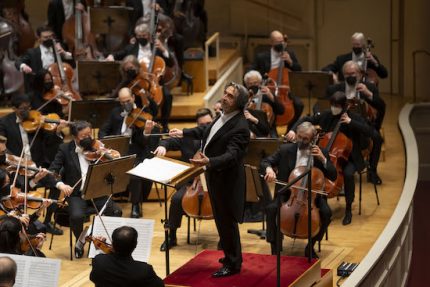Muti’s CSO new year opens with taut Beethoven, tightened restrictions

Riccardo Muti and the Chicago Symphony Orchestra were scheduled to embark on an extensive Asian tour this month. That tour was wisely but quietly cancelled last summer—with no public announcement or press release—due to ongoing Covid-19 concerns.
Apropos, the new year has brought tightened stage restrictions for CSO musicians in the wake of the current—hopefully peaking—Omicron variant. Masks are now mandatory during performances for all string and percussion players. Players must be tested before the first rehearsal each week and all wind and brass players must take daily rapid antigen tests, as well as guest artists including conductors. If the test is negative, conductors and guest artists may perform without a mask.
It’s a testament to the players that even with the understandable caution and amping up of safety protocols, the musicians performed under Muti’s baton with customary energy and excellence Thursday night.
This unexpected Muti residency could have offered an opportunity for the CSO and its music director to start off 2022 by exploring some new music and bringing some fresh repertory to its audience.
That’s not happening. Muti’s three January programs lean toward the light and familiar with Beethoven, a belated New Year’s Day-type program and baroque concertos spotlighting CSO members. A CSO spokesperson said that the concerts “were programmed with a focus on core and familiar repertoire representing several musical styles and meant to invite the community to reconnect to live performances.”
Muti and the CSO delivered the top performance of 2021 with a revelatory reading of Beethoven’s “Eroica” last fall. Neither of the two symphony performances presented Thursday were on that level though they did bring characteristically strong and polished Beethoven albeit with somewhat mixed results.
While this week’s Beethoven program adds nothing new to Muti’s Chicago repertory, the Symphony No. 8 served to plug another gap in Muti’s incomplete 2019-2020 Beethoven cycle, which was left unfinished by Covid-19 cancellations.
Over Muti’s 11 seasons in Chicago, the even-numbered symphonies have proven more elusive for the Italian maestro than the more overtly dramatic odd-number works. So it proved again with the Eighth, which Muti has only tackled once before locally in 2015.
The most Haydenesque of Beethoven’s work in the genre, the Eighth is a work of charm, wit and high spirits—Beethoven in relaxed mode having fun with musical jokes and upending expectations with somersaulting keys.
Thursday’s Eighth had all the tautness, dexterous balancing and energy that we routinely get from Muti’s Beethoven. Still in this light-hearted work, the earnest performance lacked an essential genial spirit, as was also the case seven years ago. Even the rococo tick-tock of the Allegretto seemed rather unsmiling and literal for such charming music. The finale came off best, even if, here too, Muti’s Haydn on steroids style was more cutting and emphatic than amusing.
Recompense was had throughout by individual front-desk musicians. Oboist William Welter almost single-handedly made up the charm deficit with his solo near the end of the first movement. In the quasi-minuetto, hornists David Cooper and Daniel Gingrich and clarinetist Stephen Williamson delivered delightful rustic bonhomie in the trio.
The Eighth was preceded by the Coriolan Overture. Muti led an aptly tense, finely honed rendering, with meticulously marked pianissimos in the uneasy coda.
Beethoven’s Fifth Symphony has become something of a party piece for Muti and the orchestra both at home and on tour. Muti has led more individual and electrifying performances over his decade-plus in Chicago yet it is unlikely that Thursday night’s impassioned reading disappointed any audience members.
The performance blended grace and drama deftly. The famous opening movement was tough and biting but not overdriven or peaking the structure too soon. Welter managed to make the familiar oboe solo near the movement’s coda seem so fresh as to seem almost ad libitum.
The Andante was more by the numbers, sturdy rather than subtle. The third movement was aptly ominous at the start, and the delicacy of the string pizzicatos made the segue into the blazing opening of the finale even more effective and exhilarating.
The program will be repeated 8 p.m. Saturday. cso.org
Posted in Uncategorized






Posted Jan 14, 2022 at 11:58 pm by Peter DG
Those oboe solos were delightful! The horns were most impressive.
Not the usual audience – quite noisy – nasty loud cell phone ringing during a very quiet part of #8 – somebody flipping magazine pages constantly.
Probably not the usual series subscribers crowd – more young folks. Perhaps this hints at some wisdom in CSO’s lighter programming in these added concerts.
Posted Jan 15, 2022 at 10:16 am by Robert Hunter
Riccardo Muti is way past his shelf date. None of his concerts are memorable anymore, since at least half a decade. His music making is boring and not interesting. The CSO should move on as soon as possible.
Posted Jan 15, 2022 at 3:01 pm by Lauren Heal
through the grapevine, we hear that the Maestro is generating a lot of buzz. Only not the buzz that the CSO is after.
Posted Jan 17, 2022 at 7:49 am by Tod Und Verklärung
Unfortunately, the CSO stands between those who find its performances a balm for their physically and emotionally challenged souls, and others who see it as a dusty, culturally irrelevant antique without an animating vision from its conductor, Administration, and Board of Directors.
The players and the audience wait and hope for what comes next in the form of Muti’s successor, at least those in the latter group who still care.